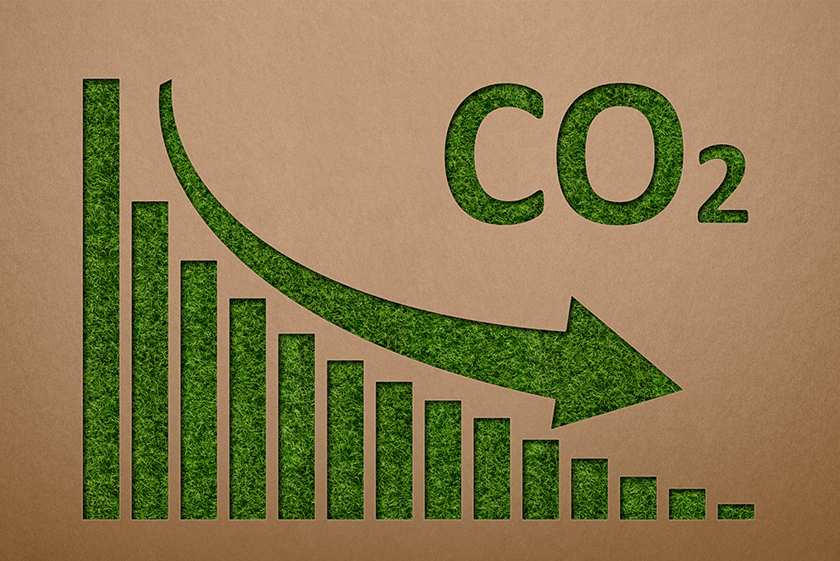
Decarbonization Study
UCR announces study to be fossil free by 2045
A UC Riverside task force has identified new pathways to operate the campus, which will eliminate 90% of associated greenhouse gas emissions by 2045. Over the past year, a state-funded study was commissioned by UCOP and implemented by UCR. The core advisory team consisted of representatives from the Academic Senate, Facilities Services, Office of Sustainability, Planning, Budget & Administration, and Planning, Design & Construction. UCR also hired a consulting firm, AECOM, to assist with this effort, as the technical engineering and planning was complex.
The study identified eight potential pathways for the campus to achieve at least a 90% reduction of energy-related Scope 1 emissions as part of UCOP’s 2023 climate action goals. Scope 1 emissions are those created onsite by burning natural gas for heating. UCR’s energy consumption includes natural gas and electricity utilities.
After conducting energy and financial cost modeling, it was determined that a centralized electrified heating system, enabled by steam-to-hot-water conversion, may be the best solution for UCR. This utilizes an electric central hot water plant with additional thermal energy storage, or TES, to optimize plant operational efficiency and enhance campus resilience.
The timeline to transition away from fossil fuel usage and decarbonize UCR’s energy infrastructure aligns with the criteria established by UCOP’s 2023 climate action goals. Additionally, each UC campus was commissioned to inform campus-specific decarbonization strategies, emission targets, and climate action planning in an effort to uphold UC’s status as a leader in climate action.
Read the full UCR Campus Decarbonization Study*.
*Deliverable 1 and 2
Deliverables
Study outputs are presented across five deliverables, described below:
- Deliverable 1 — Strategy to Achieve 90% Reduction in Scope 1 Emissions by 2045*
- Deliverable 2 — Total and Operation Cost Analysis*
- Deliverable 3 — Climate Justice and Equity
- Deliverable 4 — Climate Action Planning Considerations
- Deliverable 4 Attachment A
- Deliverable 5 — Collaborative Involvement for Climate Action and Sustainability
Energy Efficiency with Scotty
Join Scotty the Bear on his energy-saving journey to support UCR's climate action goals! Scotty offers useful tips inspired by his daily activities.
What you can do this winter to reduce UCR’s carbon emissions
Our team conducts energy audits to improve HVAC, lighting, piping, ductwork, and much more to run the campus efficiently.
However, we need YOUR help. Here are simple steps you can take to help the campus environment.
Lower your carbon footprint at UCR
- Reduce thermostat setpoint to 68 degrees Fahrenheit for heating during daytime hours. When you leave, reducing your setpoint further will save heating energy at a rate of approximately 3-5% per degrees Fahrenheit.
- Close shades or curtains at night to prevent heat loss through the windows.
- Bring a sweater or jacket with you to work/class.
- Keep air vents and registers free from obstructions.
- Report noticeable gaps and cracks around doors and windows to Facilities Services.
If you live on campus
- Wash full loads or adjust water level to fit the size of the load. Wash clothes in cold water.
- Dry two or more loads in a row to take advantage of residual dryer heat. Make sure lint filter is clean before drying.
- Don’t preheat gas ovens unless necessary. Most foods like broiled items and casseroles require no pre-heating.
- Cover pots when cooking and save additional energy by cooking multiple meals at the same time (i.e., food prepping)
- Do not use gas ovens for room heating!
Some energy efficiency items Facilities Services is already doing
- Completing energy audits for campus buildings which focus on HVAC and lighting.
- Replacing missing or damaged piping and ductwork insulation.
- Replacing broken door sweeps and seals.
- Upgrading building automation controls.
- Replacing air filters.
- Repairing air and water leaks.

